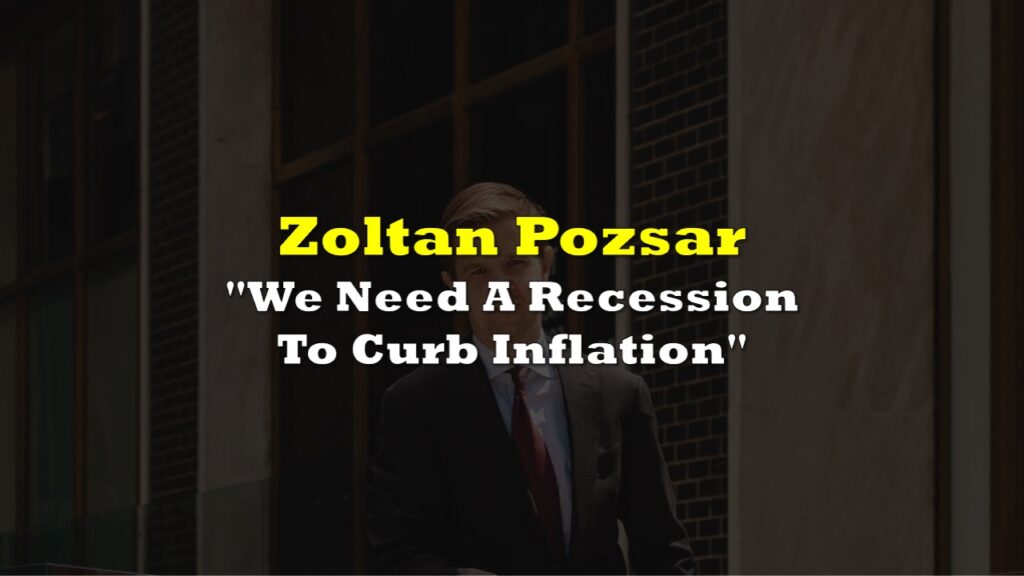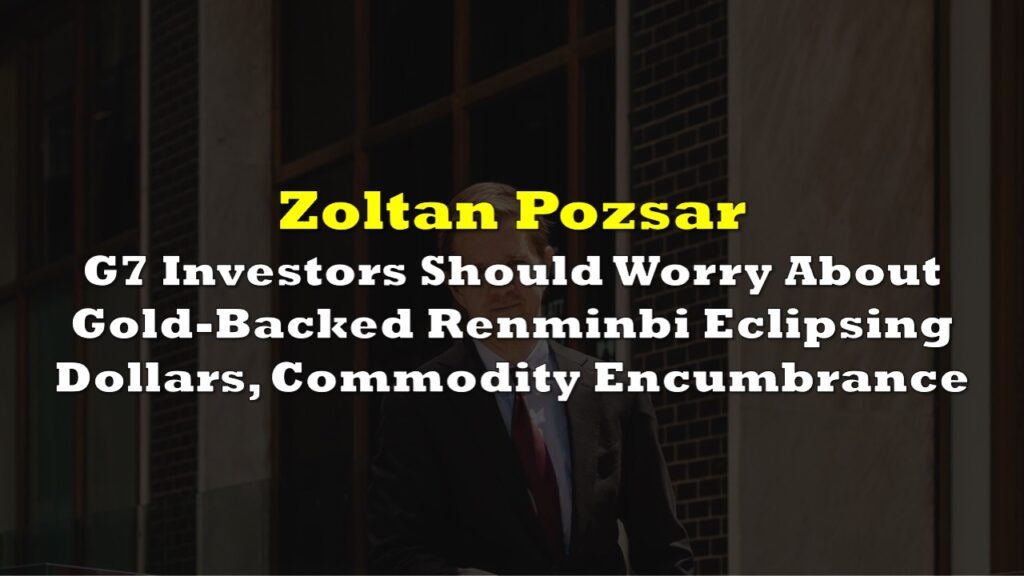In his latest dispatch, Credit Suisse contributor Zoltan Pozsar took off from his last pronouncements that an L-shaped recession is needed to curb inflation. But the path to recovery in a world gradually shifting to a new order tied to commodities isn’t gonna be solved by traditional means of QE or economic equations.
“What do we have to do to go from “L” to “L/”?” Pozsar noted. “Consumption is unlikely to generate the “/”, as we don’t have the old “spouses” to import from. It follows that we will have to produce stuff on our own: “/” will come from investments, with help from the government.”
Pozsar takes this view from the resulting “alliance of the sanctioned” among Turkey, Russia, Iran, China, and North Korea. Russia and China, in particular, are having their economic ties with the West severely threatened–sanctions for the former, diplomatic relations for the latter.
“The special relationship (“alliance”) between China and Russia is a little bit as if one disenfranchised spouse (China from the Chimerica union) found another (Russia from the Eurussia union) to form an economic union out of revenge: one gets commodities it does not have, and the other chips and other stuff it can no longer get from the West owing to Western sanctions.”
While the Russia-China alliance would take time to complete–let alone, dominate–an economic world order on its own, the two states are serious challengers of the US hegemony. In a commodities-based economy, the producers get to dictate the movement of the global economy.
The chip problem
To illustrate the effects of war on the industry, Pozsar dived deep on the weaponry and artillery involved in the current global conflicts. Citing a Financial Times article, he noted that the US has fast depleted its stockpiles as it supports Ukraine in its war with Russia, given with how Washington DC has invested more on chip-enabled, sophisticated weaponry.
“[Fetishes] for high-tech weapons and lean manufacturing have obscured the importance of maintaining stockpiles of basic kits. Total annual US production of 155 million artillery shells, for example, would last only about two weeks in Ukraine,” Pozsar quoted the article.
Aside from basic artillery, manufacturing replacements for chip-enabled weapons are also hard to fast track. Aerodefense firm Raytheon said that it will take them “a little while” to produce Washington DC’s order of 1,300 Stinger anti-aircraft missiles to replace those sent to Ukraine. The slow replacement not only affects the domestic capacity but also the other “wars” and alliances that the US wants to protect, like Taiwan.
The chip shortage has reached a point that Netherlands-based semiconductor supplier ASML’s CEO Peter Wennick related a story where an “executive of a very large industrial company” told him they’re “buying washing machines to rip out the chips to put them into industrial modules.”
China’s blockade on Taiwan–one of the West’s leading chip exporters–is also putting a strain on the supply chain.
Weaponizing commodities and waging economic wars have exposed what Pozsar describes as the “the implosion of the long-intermediation chains of the globalized world order.”
“The triggers aren’t a lack of liquidity and capital in the banking and shadow banking systems, but a lack of inventory and protection in the globalized production system, in which we design at home and manage from home, but source, produce, and ship everything from abroad, where commodities, factories, and fleets of ships are dominated by states – Russia and China – that are in conflict with the West,” Pozsar said.
For its part, the West–the US in particular–has imposed sanctions that are expected to slow down the budding economic bubble by the alliance of the sanctioned, including banning ASML to sell lithography machines to China’s chipmaker SMIC. Washington DC is also mulling possible shipment restrictions “of chipmaking equipment to producers of memory chips in China.”
But for Pozsar, this might not be enough.
“I get it why the U.S. wants to invert time. But we can’t win by slowing progress. We’ll also have to progress by building, and that’s where industrial policy comes in,” he noted.
The 4R policy
Pozsar theorized that the West will have to pour trillions into four types of projects starting “yesterday”–re-arming its weaponry, re-shoring its sources, re-stocking its inventories, and re-wiring the energy grid.
“Similar to how Basel III was the “tab” associated with the Great Financial Crisis, the above list is the tab for the currently unfolding “Great Crisis of Globalization”,” he described.
On re-arming, the West needs to follow through on investing on its weaponry to defend the world order, jumpstarted by Germany’s plan to spend US$100 billion on arms, the West’s plan to spend US$750 billion on rebuilding Ukraine, and the G7’s plan to generate a US$600-billion plan to counter China’s Belt and Road initiative.
On re-shoring, the West must come up with domestic production sources and processes as it cannot rely on allies alone to import its necessities, as illustrated by China’s blockade on Taiwan. Pozsar noted the US$52-billion CHIPS Act in Congress, with specific measures to fund initiatives in sourcing out other chip-producing sources for the country’s weaponry, is “just the beginning.”
On re-stocking, Pozsar pointed to the current energy crisis in Europe where EU states must start or intensify filling up their reserves. He also added that the US must restock, not just its depleting strategic petroleum reserves, but its food commodities as well–as the country fights historic droughts on the home front and the commodity supply chain with China and Ukraine.
On re-wiring the energy grid–while this has been a key policy since before the pandemic and the wars as the world transitions to clean energy sources–the emphasis on realigning its sources given the contentious relationship with Russia has to be underlined.
“I think that the above four themes will be the defining aims of industrial policy over the next five years,” Pozsar said. Having said that, he further expounded on what would these key policies mean for investors in global markets.
First, Pozsar said that these policies would be commodity and capital-intensive. The high need for commodities in the above-mentioned scenarios could lead to a demand shock “in a macro environment in which the commodities sector is woefully underinvested.” Given the need to increase production, the above to-dos would also need more capital for the governments and private sectors to build the capabilities.
Also, in executing the to-dos, the implementation also has to be insensitive to interest rates because, as Pozsar puts it, “industrial sovereignty depends” on the successful execution of the policies. Whether “the Fed hikes rates to 3.5% or 7%,” executing on the to-do-list is imperative.
While he noted that private equity depends on interest rates, he believes that industrial policy will “eventually “crowd out” private equity” when done right.
Lastly, Pozsar noted that the above-mentioned policies should take into consideration its nature of being uninvestable for the East markets. Aside from the potential ramifications of defaults–as exemplified by Russia’s foreign exchange reserves–the East would logically not bankroll initiatives to strengthen the West’s world order against the East.
“[Sadly] things make no sense to continue like they used to, be either from a real (trade/production) perspective or a financial (FX reserves) perspective…which is why Bretton Woods III is destined to happen. It’s already happening,” Pozsar ended.
Information for this briefing was found via Credit Suisse. The author has no securities or affiliations related to this organization. Not a recommendation to buy or sell. Always do additional research and consult a professional before purchasing a security. The author holds no licenses.










One Response
Excellent summary of one of the most important global macro strategists in the world…it’s safe to say that’s numéro uno at the moment because of his sheer ballsiness and command of the subject. Most macro strategists are now just copying Zoltan’s work.